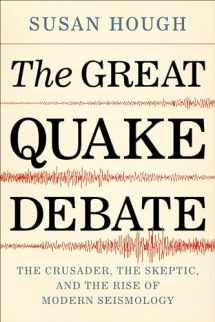
The Great Quake Debate: The Crusader, the Skeptic, and the Rise of Modern Seismology
Book details
Summary
Description
Review
"Hough presents a well-researched narrative...Interesting read, tracing the history of this seismic and scientific debate."―Choice
"Seismologist Susan Hough's account offers a revealing glimpse of the personalities and issues within America's geologic community in the early twentieth century. But it also can be read as a cautionary tale about science and society."―Natural History Magazine
"Hough's book...touches the history of a subfield of earth science that has been only rarely studied before: seismology."―H-Net
"This book is historical and biographical writing at its very best."―Environment and History
"The Great Quake Debate gives all readers―historians, scientists, and interested non-experts―excellent insights into the unfolding of scientific community and scientific investigations of earthquakes in the United States, a topic crucial to public and private life then, and still."―Pacific Historical Review
"A delightful, timely glimpse into a little-known but fascinating debate among earthquake scientists regarding the seismic threat to southern California."―Alexandra Witze, coauthor of Island on Fire: The Extraordinary Story of a Forgotten Volcano That Changed the World
"A window into a formative time in earthquake seismology, extraordinarily well-researched and full of personal details."―Marcia Bjornerud, author of Timefulness: How Thinking Like a Geologist Can Help Save the World
"An important reminder to live with an open mind and prepare for the hazards that ravage this planet we live on, for our lives may depend on it...Willis's and Hill's stories in the book provide a detailed and valuable account of the work and life of geologists in the late nineteenth- and early twentieth-century United States."―Janine Krippner, Global Volcanism Program, Smithsonian Institution
"Hough is the ideal author for this story, being a seismologist herself, steeped in the history of her trade, and a masterful raconteur. Whether it's how to reopen the economy after a pandemic, or what to do about climate change, the great quake debate was a precursor for modern tussles between science and policy."―Callan Bentley, geologist, Northern Virginia Community College
In the first half of the twentieth century, when seismology was still in in its infancy, renowned geologist Bailey Willis faced off with fellow high-profile scientist Robert T. Hill in a debate with life-or-death consequences for the millions of people migrating west. Their conflict centered on a consequential question: Is southern California earthquake country?
These entwined biographies of Hill and Willis offer a lively, accessible account of the ways that politics and financial interests influenced the development of earthquake science. During this period of debate, severe quakes in Santa Barbara (1925) and Long Beach (1933) caused scores of deaths and a significant amount of damage, offering turning points for scientific knowledge and mainstreaming the idea of earthquake safety.
The Great Quake Debate sheds light on enduring questions surrounding the environmental hazards of our dynamic planet. What challenges face scientists bearing bad news in the public arena? How do we balance risk and the need to sustain communities and cities? And how well has California come to grips with its many faults?
Book Description
The story of an epic clash over California's earthquake future


We would LOVE it if you could help us and other readers by reviewing the book
Book review



